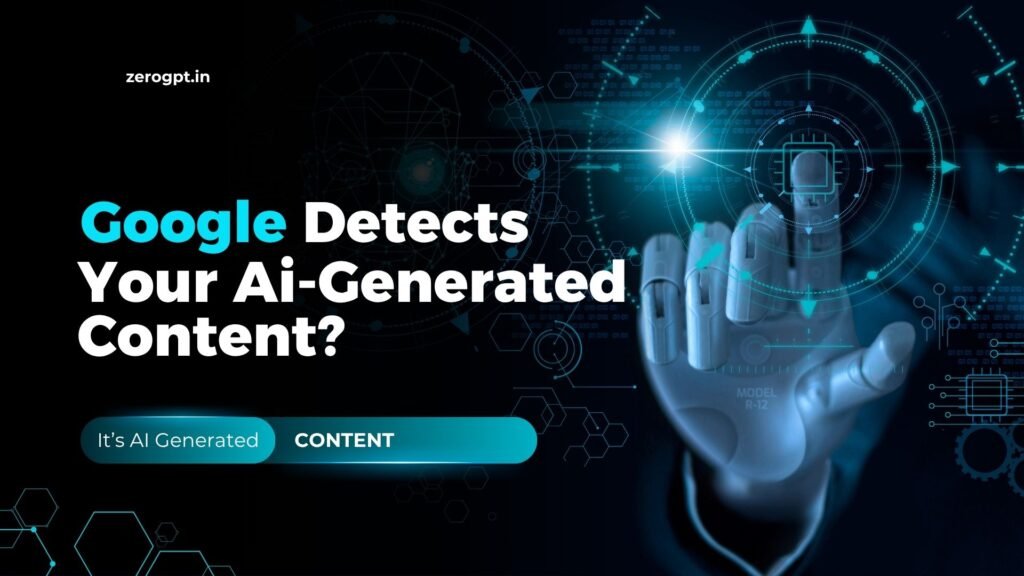So, you’re wondering if Google can actually tell when you’ve used AI to write your stuff, right? Google Detect AI-Generated Content and if they do, will they get mad? It’s a question a lot of people are asking these days, especially with tools like ChatGPT getting super popular. It feels like everyone’s using them. So, let’s look into how Google sees all this AI-generated text. We’ll talk about if they can spot it, and what you should do to make sure your content still does well in searches.
Key Takeaways
- Google’s main goal is to show helpful, good quality content, no matter if a human or AI made it.
- Google has ways to spot low-quality content, and this includes AI stuff that’s just thrown together.
- Using AI tools is fine, but you need to make sure the final content is edited and really good.
- Content that’s genuinely useful and trustworthy will do better in search results.
- The rules for AI content might keep changing, so staying updated on Google’s advice is smart.
Stance on Google AI-Generated Content

Google’s Official Policy on AI Content
Okay, so where does Google actually stand on AI content? It’s not as simple as a yes or no. Google’s official line is that they don’t penalize AI content just for being AI. They care about the quality. If you’re using AI to pump out junk, that’s a problem. But if you’re using it to create something helpful and informative, then it’s all good. Think of it like this: Google’s always been about showing users the best results, no matter how they’re made. You can always check Google’s webmaster guidelines for more information.
Distinguishing Low-Quality Content from AI Content
This is where it gets tricky. How does Google tell the difference between good AI content and bad AI content? Well, they’re not necessarily trying to detect AI itself. What they’re really after is low-quality stuff. Things that are thin, unoriginal, or just plain spammy. These are the things that violate their spam policies. It’s more about the outcome than the method. If your content is helpful, well-written, and provides value to the user, it probably doesn’t matter if a human or a robot wrote it. It’s important to remember that appropriate use of AI is not against their guidelines.
The Role of AI Overviews in Content Quality
AI Overviews are Google’s way of summarizing information for users right on the search results page. This means that content needs to be even more concise and to-the-point. If your content is rambling and unfocused, it’s less likely to be featured in an AI Overview. So, in a way, AI is pushing content creators to be better. It’s forcing us to focus on providing clear, accurate, and helpful information. The goal is to show the most relevant and helpful content, so if you can achieve that goal with AI content, then go for it. Google is not against ALL forms of AI content, but using automation to manipulate ranking in search results is a violation of their spam policies. The focus should always be on creating content that is genuinely helpful to users.
Google’s main goal is to show the most relevant and helpful content. If you can achieve that goal with AI content, then go for it. It’s all about providing value to the user, regardless of how the content was created.
Can Google Detect AI Content?
Evolving Detection Capabilities
So, can Google actually tell if something’s written by AI? It’s a tricky question. Google’s definitely been working on its ability to spot patterns that suggest AI generation. Think about it – they’re constantly tweaking their algorithms, and AI detection is probably part of that. It’s not perfect, though. If you just churn out raw AI text, it’s more likely they’ll catch it. But if you put in the effort to edit and refine the content, it becomes much harder to detect. The game is always changing, and Google’s detection methods are evolving all the time.
Patterns Indicative of AI Generation
What exactly gives AI content away? Well, there are a few telltale signs.
- Repetitive phrasing
- Lack of unique insights
- Overly formal or robotic tone
- Factual inaccuracies
AI often struggles with nuance and real-world experience. It can generate text that sounds good on the surface but lacks depth or originality. If your content reads like it was written by a robot, Google might flag it. It’s about looking for those subtle clues that separate human writing from AI-generated text.
Anecdotal Evidence of AI Content Detection
I’ve heard stories from other bloggers about their sites getting hit after publishing a bunch of AI-generated articles. It’s all anecdotal, of course, but it makes you wonder. Some people swear they saw a dip in rankings after using AI, while others claim their AI content is doing just fine. It’s hard to say for sure what’s going on behind the scenes at Google, but these stories suggest that they’re at least capable of detecting some AI content.
It’s important to remember that Google’s main goal is to provide users with helpful, high-quality content. If your AI-generated content meets that standard, you’re probably in the clear. But if you’re just using AI to churn out low-quality articles, you might run into trouble.
Penalties for AI-Generated Content
Understanding Google’s Spam Policies
Okay, so Google doesn’t hate AI content, but they really, really hate spam. And a lot of AI-generated stuff can easily fall into that category. Think about it: churning out tons of articles with no real substance, just trying to game the system. That’s a big no-no. Google’s spam policies are pretty clear about this. It’s not about how the content was made, but what the content is. Is it helpful? Is it original? Or is it just fluff? If it’s fluff, you’re in trouble. Make sure you understand Google’s spam policies to avoid any issues.
When AI Content Leads to Penalties
So, when does AI content actually get you penalized? It’s not just about using AI; it’s about how you use it. If you’re using AI to create low-quality, unoriginal content at scale, you’re asking for trouble. Here’s a few things that could get you in hot water:
- Generating large amounts of nonsensical content.
- Keyword stuffing like crazy.
- Presenting inaccurate or misleading information.
- Creating content that adds no unique value.
Basically, if you’re using AI to try and trick Google, you’re going to have a bad time. It’s a dangerous game to play, and Google’s getting better at spotting it.
The key takeaway here is that Google cares about quality. If your AI-assisted content is high-quality, original, helpful, and serves the user, you’re unlikely to face penalties. If it’s low-effort spam, you likely will, just as you would if a human wrote the same poor-quality content.
Focus on Content Quality, Not Origin
Ultimately, Google’s focus is on the quality of the content, not whether a human or a robot wrote it. If your content is good, it’s good. If it’s bad, it’s bad. It’s that simple. Don’t get so caught up in how you’re creating content that you forget to focus on what you’re creating. Make sure it’s well-written, informative, and provides value to the reader. If you do that, you’ll be in good shape. Remember, human writers can also produce low-quality content, and that will also be penalized.
The Impact of AI on SEO Rankings
AI Content and Search Performance
AI’s impact on search engine optimization is complex. It’s not as simple as “AI content is bad” or “AI content is good.” It really depends. The key is understanding how AI-generated material affects your site’s visibility and ranking. If you’re churning out tons of AI-written articles that are thin on substance, expect to see a drop. But, if you’re using AI to enhance your content creation process, you might see some positive results. It’s a tool, and like any tool, it can be used well or poorly.
Human-Generated Content Versus AI
Is human-generated content inherently better than AI content? Not necessarily. A poorly written article by a human won’t outrank a well-crafted, informative piece that was aided by AI. However, there’s something to be said for the E-E-A-T (Experience, Expertise, Authoritativeness, and Trustworthiness) signals that Google looks for. It can be harder for AI to demonstrate those qualities without significant human oversight. Think about it: can an AI really have “experience” in the same way a human can?
Optimizing AI Content for Search
So, you’re using AI to create content. How do you make sure it performs well in search? Here are a few things to keep in mind:
- Focus on quality: This should be obvious, but it’s worth repeating. Make sure the content is accurate, informative, and engaging.
- Add your own voice: Don’t just publish the raw output from the AI. Inject your own personality and expertise into the content.
- Optimize for keywords: Use relevant keywords, but don’t stuff them in. Focus on natural language and user intent.
It’s important to remember that Google is constantly evolving its algorithms. What works today might not work tomorrow. The best approach is to focus on creating high-quality content that provides value to your audience, regardless of how it’s created.
Here’s a quick look at how AI can help (or hurt) your SEO:
| Factor | AI Assistance (Potential Benefit) </th> get the work done.
Leveraging AI Ethically for Content Creation

Strategic Use of AI Tools
Okay, so AI is everywhere, right? But just because you can use it for everything doesn’t mean you should. Think of AI tools as assistants, not replacements. They’re great for brainstorming, outlining, and even drafting, but they shouldn’t be the sole creators of your content. It’s like using a calculator – it helps with the math, but you still need to understand the concepts. Don’t just blindly trust the output; use your own brain, too!
Refining AI Output for Quality
AI-generated content is often generic and lacks a unique voice. It’s your job to inject personality, add specific examples, and ensure it aligns with your brand. Always edit and refine the AI’s output. Fact-check everything! AI models can make mistakes, so don’t assume everything it generates is accurate. Think of it as a first draft that needs your human touch to make it shine. You should always aim for ethical AI in digital marketing.
Integrating AI into Your Workflow
Here’s how I’ve been trying to make AI work for me, not replace me:
- Brainstorming: I use AI to generate initial ideas and outlines. It helps me get past the blank page.
- Research: AI can quickly gather information on a topic, saving me time on initial research.
- Drafting: I use AI to create a rough draft, which I then heavily edit and rewrite.
The key is to find a balance. Use AI to automate repetitive tasks and speed up your workflow, but always maintain control over the final product. Your unique perspective and expertise are what will make your content stand out.
It’s all about finding what works for you. Don’t be afraid to experiment and see how AI can best fit into your content creation process. Just remember to always prioritize quality and originality.
Google’s Continued Focus on Helpfulness
Google’s main goal is still to give users the best possible experience. This means showing content that’s actually useful and answers their questions. They’re always working on ways to figure out what content is truly helpful, and AI is just another factor in that equation. It’s not about how the content is made, but what it offers to the person searching.
E-E-A-T Principles and AI Content
E-E-A-T (Experience, Expertise, Authoritativeness, and Trustworthiness) is still super important. Google uses these principles to judge content quality, regardless of whether it’s written by a human or generated by AI. If AI content doesn’t demonstrate E-E-A-T, it’s not likely to rank well. Think about it – would you trust a medical article written by an AI that hasn’t been reviewed by a doctor? Probably not. Google feels the same way. It is important to understand E-E-A-T principles.
Systems for Detecting Unhelpful Content
Google has systems in place to identify content that doesn’t meet user needs. These systems look for things like:
- Keyword stuffing
- Thin content with little substance
- Content that doesn’t accurately answer the user’s query
Google’s algorithms are constantly being updated to better understand user intent and identify content that provides a poor experience. This includes content that is misleading, inaccurate, or simply not helpful.
Prioritizing User Experience
Ultimately, user experience is king. If people find your content helpful and engaging, Google is more likely to rank it higher. This means focusing on things like:
- Creating clear and concise content
- Using visuals to break up text
- Making your website easy to navigate
It’s all about making sure the user gets what they need quickly and efficiently. If you do that, you’re on the right track. Google wants to surface reliable information, no matter how it’s created.
The Future of AI and Search in 2025
Widespread Adoption of Generative AI
By 2025, generative AI is everywhere. It’s not just a tech buzzword anymore; it’s woven into the fabric of content creation and consumption. Surveys from earlier this year showed that a huge percentage of companies were already using it regularly. I think that number will only go up. It’s becoming less about if you use AI and more about how you use it effectively.
Google’s Ongoing Algorithmic Improvements
Google’s algorithms are constantly evolving, and their ability to understand and assess content quality is only getting better. They’re really focused on figuring out what’s helpful and what’s not. It’s a never-ending game of cat and mouse, with AI content creators trying to stay one step ahead, and Google working to ensure users get the best possible search results.
Adapting Content Strategies for AI Evolution
Content strategies need to be super flexible. What worked last year might not work today, and it definitely won’t work next year. Here are some things to keep in mind:
- Focus on E-E-A-T (Experience, Expertise, Authoritativeness, and Trustworthiness).
- Prioritize original research and unique insights.
- Don’t rely solely on AI-generated content; human oversight is key.
The key is to use AI as a tool to augment your content creation process, not replace it entirely. Think of it as a way to brainstorm ideas, create outlines, or even generate initial drafts, but always add your own unique perspective and expertise.
Wrapping Things Up: What This Means for You
So, what’s the big picture here? Google isn’t really trying to catch you using AI just for the sake of it. They’re more focused on whether your content is actually good and helpful for people. If you’re just pumping out tons of low-quality stuff with AI, yeah, that’s probably not going to fly. But if you’re using AI tools to help you make better, more useful content, that’s a different story. It’s all about quality, no matter who or what wrote it. Think of AI as a helper, not a replacement for real thought and effort. Keep making good stuff, and you should be fine.
Frequently Asked Questions
Does Google ban content made by AI?
Google doesn’t forbid using AI to create content. Their main concern is about the quality and purpose of the content. If AI helps make helpful and good stuff, that’s fine. But if it’s used to make lots of junk just to trick search rankings, that’s a problem.
How will Google stop bad AI content from filling up search results?
Google has been dealing with bad quality content for a long time, whether it’s made by people or computers. They have special systems that check if content is helpful and original. They keep making these systems better to make sure good content shows up first.
Will Google punish my site for using AI content?
Google isn’t against AI content itself. They focus on whether the content is useful and follows their rules. If AI content is spammy or tries to trick the system, it’ll get penalized, just like bad content made by a person would.
Can Google tell if content was written by AI?
Yes, Google has ways to spot patterns that look like AI made the content, especially if it hasn’t been checked or changed by a human. Their tools are always getting smarter. However, Google says they care more about whether the content is bad quality, not just if it was made by AI.
Will I get penalized just for using AI to write content?
No, Google won’t penalize you just for using AI. They only penalize content that is spammy, not helpful, or made just to cheat the search rankings. This applies no matter if a human or AI made the content.
How can I use AI for content without hurting my Google ranking?
Google wants content that is helpful, trustworthy, and well-researched. If you use AI, make sure to review and improve its output. Add your own insights, check facts, and make sure it sounds natural and human. This way, your AI-assisted content can still rank well.



